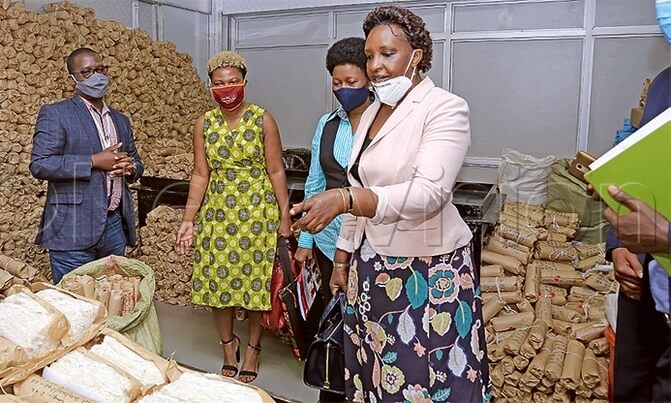
Our Projects are
Transforming African Trade
Quick Contacts
2nd Floor, Fidelity Insurance Centre Waiyaki Way, Westlands

Uganda’s export revenue from cotton is set to increase following the launch of the Cotton Development Organisation (CDO) module under the Uganda Electronic Single Window (UESW) system.
This will see stakeholders enjoy reduced paper-based procedures and delays in getting the required regulatory documents for export, such as ginnery certificates, ginning certificate, lint export certificate and the lint quality certificate.
This, according to the TradeMark Africa acting country director for Uganda, Damali Ssali, will enable the country export more cotton and increase export revenue from the cash crop.
Figures from Bank of Uganda indicate that cotton is among Uganda’s top 10 exports, having fetched the country $54.26m (sh199.9b) in export revenue in the 2018/19 financial year. It, however, declined to $41.69m (sh153.6b) in 2019/20.
She said the growth in coffee exports during the lockdown period was partly due to the UESW.
Uganda’s coffee exports increased from $36.93m in April and rose to $42.48m in May 2020, before rising to $49.98m in July.
The UESW is a system that leverages technology, to allow traders submit all the required regulatory documents, such as permits and customs declarations, to approving agencies electronically, using a single access point.
Previously, agencies were working in silos, requiring traders to move with physical documents from one office to another, to get the necessary trade certificates. This causes delays and also increases the cost of doing business.
Ssali, who was speaking during the launch of the CDO module at the Cotton House in Kampala, said the UESW implementation has contributed to safe trade by limiting interactions through automation of trade processes.
“I credit the single window because it has played a great role during COVID-19.
“Without it, I do not know how it would have been if people had to walk around with physical documents to clear,” Ssali said.
She added: “People were still able to clear their goods, both imports and exports, as long as their Ministry, Department or Agency (MDA) was on the single window.”
Ssali said so far, six out of the 10 agencies responsible for agricultural export are already on the single window.
These include fisheries, coffee, tobacco, dairy, timber and cotton.
“We hope that one day, we will have all the top 10 agencies automated, so that everything is processed through the single window,” Ssali said.
Ssali said the UESW is funded by DANIDA, through TMA, to a tune of $10m (sh36.8b).
“Let us keep the benefits flowing and let us not lose on the efficiencies that come out of this UESW.
I believe this is the system that will take us to the next level,” Margaret Magera, a senior programme advisor for private sector development with DANIDA, said.
Geoffrey Sozi who represented Abel Kagumire, the Uganda Revenue Authority commissioner for customs, said the UESW had reduced the clearance time from 21 to four days for imports and two days for exports.
He lauded the government of Denmark and TMA for supporting the trade facilitation platform, where traders can access services of all MDAs, involved in international trade through electronic submission of regulatory documents in fulfilment of import, export and transit-related requirements on a single protocol.
The CDO managing director, Jolly Sabune, said easing doing business for stakeholders in the cotton sub-sector, especially ginners and lint exporters, has always been the organisation’s desire, adding that the UESW will benefit them in several ways, including cutting transaction costs since most of the ginners and lint exporters are based upcountry.
Francis Koluo, the principal commercial officer at the trade ministry, said the ministry intends to focus on rolling out to cover more agencies, as well as capacity building for the stakeholders, focusing on the private sector, to enable them interact efficiently with the system. There are currently 18 agencies on the system.
He said the UESW is enabling the private sector to trade in an easy, transparent and predictable environment.
To ensure sustainability, Koluo said the ministry, as the leading system co-ordinator, received a nod from cabinet, when it agreed that resources will be allocated to ensure that the system benefits everyone.
Read the original article
Disclaimer: The views and opinions expressed in this article are those of the authors and do not necessarily reflect the official policy or position of TradeMark Africa.